![]()
The Words of the Downey Family
|
|
The Words of the Downey Family |
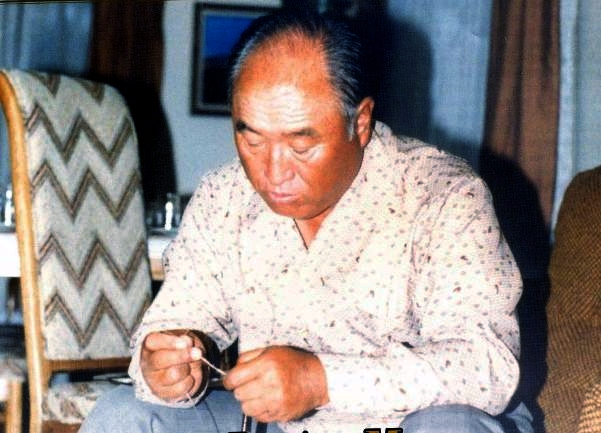
I first saw Father in Washington D.C. in October 1973. He spoke at Lisner Auditorium as a part of the Day of Hope Tour. I bought a ticket from a young lady that had knocked on my door in Alexandria, Virginia. I had told her at first that I wasn't interested in buying tickets to a lecture. She knocked on the door again fifteen minutes later and asked to use the bathroom. I said, sure. I was interested in young ladies. We talked for a long time, and I coughed up the last of my money and bought a ticket.
On the night of the speech, I hitchhiked into D.C. because my very temperamental Triumph TR-4 wouldn't start. The speech was an odd experience. I remember thinking how strange it was for a Korean guy in a suit and tie to jump around and shout about God's hope for America. The fellow interpreting for him seemed a lot more reasonable.
I was taken by the bright young people that I met. I was very attracted to the vibe that surrounded them. I suppose they were love-bombing me but I liked it. After the event, I was out of there and back on duty at the Marine Barracks. No one ever recontacted me.
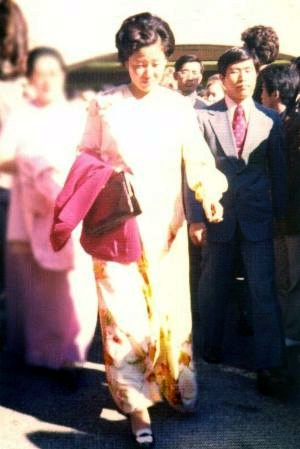
True
Mother and Mrs. Won Pok Choi outside the Belvedere Training Center
About two months later, I encountered these young people again. The Marine Band was scheduled to play at the national Christmas tree lighting ceremony on the Ellipse behind the White House. I was assigned to security detail and was posted to the right of the band shell in front of the band. President Nixon was in attendance and threw the switch. What I saw amazed and puzzled me. As I stood at parade rest, I continually scanned the arriving crowd. In marched what I thought at that time was a vision from heaven. A whole troop of nine- or ten-year-old Korean girls in matching red coats filed in, smiling and waving little blue and white pennants. They looked like angels. The crowd was composed mostly of young people that were all waving the same triangular flags. Looking closer, I read the writing on the flags: Forgive, Love and Unite. Some of the flags said "God loves Nixon." How strange! This was the height of the Watergate crisis when nobody loved Nixon including (probably) God.
Next, I recognized some of the young people by their bright smiles and (I guess) by their vibe. I knew these were the same people that I had met and liked so much at Lisner Auditorium. I wondered to myself, what's going on here? What's the connection between that event and this one?
At the end of the ceremony, President Nixon left the stage and he and his entourage left the band shell, turned right and rushed along the narrow pathway between the band shell and where the Marine Band was set up. Although surprised, I was no slouch. I had had some training and I popped to attention, saluted and in my best parade deck voice sounded off, "Good afternoon Mr. President." The president stopped, turned to me with a big smile, saluted and said, "Thank you Marine. Where are you from, son?" By this time the whole entourage had stopped and bunched up. The Secret Service guys were pushing and shoving, trying to get the entourage moving again. Of course, I told him I was from Ohio. He replied, "Ohio. Good. Enjoy your time in D.C." He smiled again, turned and they all hurried off.
Next those smiling, flag waving young people, in a wave, overran the red-coated Marine Band members and me. They never got to the president. Years later when I recalled this incident, I realized that on that day I had lifted up the president.
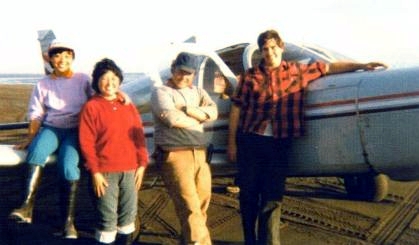
From
left: Yoko Thompson, Atsuko Kirst, Mike Downey and David Barker in
Egegik, Alaska. The only way in or out was by air or sea.
The next time I saw Father was in the spring of 1975 at the Barrytown training center. By that time I had already heard the Principle, accepted Father as the Messiah, joined the movement in Columbus, Ohio, and debated with the other brothers important topics like "How could a perfect person need to wear glasses?" and "Could he levitate like other spiritual masters?" At that time, Father had selected 120 missionaries each from America, Japan and Europe, mainly Germany, to go to 120 different nations. The Americans were at Barrytown for 120 days of training before going out. I was with other members that trained alongside them in a forty-day cycle. During that spring, Father visited almost every day to talk to the missionaries. I formed my first real impressions of the man at that time.
One day Father and Mother arrived; Mother took a seat and Father stood. He began by looking down at us with what can only be described as an impish grin and fingered his necktie. He asked, "Do you like my tie?" He was wearing light brown polyester slacks, a sport coat, a flowered Hawaiian-style shirt and a brown and gold striped necktie. He went on to explain that when he got up that morning Mother had complained, "Father, you never wear a tie anymore." So he put on the tie for Mother. He thought it was very funny; so did I. This is when I really began to like him. Another time, he drew a straight line on the board and said that the fastest way to get from A to B is a straight line. Then he drew a zigzagging line starting at A and finally arriving at B. He explained that a person that has many different experiences in life can be a good leader. Now I really liked him for his simple wisdom. One day he talked at length about the role of the media in society. Of course, at that very time, Rev. Moon was under intense attack by the major media outlets in America. He advised the missionaries to work with the media in their mission countries and even to start a newspaper. He planned to start a major newspaper in America and link it to papers in Korea, Japan and others around the world. The true role of the media is to speak out against injustice and give a voice to the disadvantaged. I understood his deep identification with the downtrodden and his sense of righteousness, and I loved him for this.
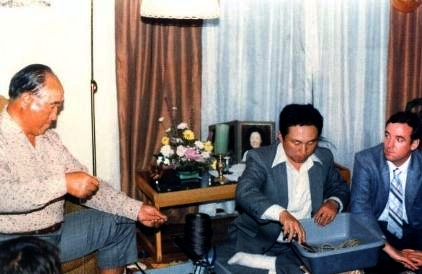
Father
making a fishing rig for halibut with the help of Mr. Joo Chan Choi,
then president of International Seafoods of Alaska. The author was in
the audience.
After five months at Barrytown I was sent out as a pioneer. After the Yankee Stadium rally I was sent to Mississippi as a state leader. Only three members existed in all of Mississippi, so essentially it was pioneering again. The great and terrible thing was that Father wanted to personally train us, so every month we were all called to a state leaders' meeting with Father. He spent hour after hour pouring out his heart, wisdom and experience to us in the hopes that we would be able to stand up and take responsibility for saving America. He also reported to us all the things he was doing. Most of us, on the other hand, had little to report. One day after Sunday service at Tarrytown, Father invited us to meet him at Barrytown. When we arrived, Father was out front with a few seminary brothers working on a fishing net. He told us that it was a box trap for catching carp in the Hudson River. We all went down to the river to set it up. There was a lagoon created by a narrow inlet in the railroad berm that ran along the riverside. The lagoon flooded and drained daily as the tide rose and fell. The plan was to set up the trap in the lagoon at low tide and when the tide came in, the fish would swim into the trap and would be caught.
Father worked from a skiff while four of the tallest brothers stood in the water and attempted to secure the four corners of the net to four poles. I don't know what happened, but apparently some mistakes were made. Before the trap could be anchored, the tide flooded in, and the situation got pretty dicey. One brother had to be pulled out before he drowned. Time and tide wait for no man; the attempt failed. We were all sent up to the seminary for lunch while Father remained behind. As we ate lunch and rested Father worked on plan B. With Gerhard standing in the water holding the skiff, Father strung an improvised net all the way across the lagoon. We were called back as the water ebbed out. As the mud flat emerged, hundreds of flopping wriggling carp appeared. All we had to do was crawl on our bellies in the mud and devil's heads and wrestle each fish up onto the bank. Of course we had all arrived for the day's fishing in suits and ties. We were given access to a barn with a large accumulation of used clothes. My only problem was footgear. I found a pair of sneakers that fit but they had no laces. I put the sneakers on and a pair of socks over the sneakers to keep them on. Later in the day, In Jin Moon saw me and laughed. "What are you wearing? It looks so funny." Hey, it worked.
I don't remember how many carp were caught that day, maybe three hundred. They completely tilled the bed of a dump truck. We all felt victorious that day. Father took responsibility and made it happen. The next day we all went to East Garden and celebrated True Parents' wedding anniversary. At that time Father asked Mother to give her testimony. She talked about her painful course and she cried and cried as she talked. At the end, she said, No more tears.
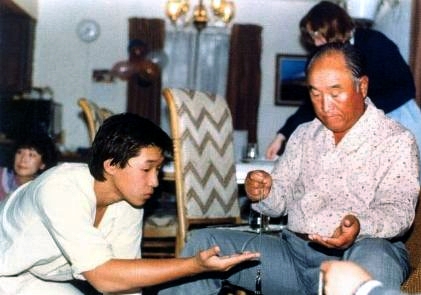
Heung
Jin Nim, mere months before his ascension, assisting Father
In 1983, I was fishing for giant blue tin tuna with Ocean Challenge out of Gloucester, Massachusetts. I was crewing for Dr. Tyler Hendricks on a Good Go boat. Dr. Hendricks was an old comrade and had just graduated as the first UTS graduate to continue on and get his PhD. Of course, Father appointed him head of Ocean Church. We had a great summer hanging out, and we caught nine tuna. Once, Father came out to the grounds to see Dr. Hendricks. Father's boat came alongside and I caught the lines and held the two boats together. Father started talking about various knots and what they are best used for. Then he talked about Ocean Church and his vision for the ocean. He explained clearly why ocean training was important. He told us that living on the ocean is more difficult than life ashore. If you train to do difficult things at sea, those same things will become much easier on land. When the difficult things become easy, you can lead other people. His message that day reinforced my desire to go to sea.
A couple of weeks later, Ocean Challenge asked if I wanted to work on boats in Alaska. I didn't hesitate. I was informed that they needed two guys and if I wanted to go I had to be interviewed by Father. That day I was taken by boat out to the northwest corner to meet Father. The interview took place via VHF radio through a translator. Father said that if I went to Alaska I would have to carry a million dollars in one pocket and a pistol in another.` I told him I was an ex-marine and I could do that. He said to go right away. Another guy and I were on a flight out of Boston's Logan Airport that night.
When we arrived in Kodiak, Alaska, True Parents and Heung Jin Nim were already there and staying at a house on Bancroft Road. Since we had just arrived, we were invited to have dinner with True Parents. The table sat eight people and the menu was king crab. I put my head down and focused on eating. Finally Father asked in English, "Mack, do you like king crab?" In Alaska, Father always called me Mack for some reason. Later, in Korean, Mother asked Mr. Choi Joo Chan, president of International Seafoods of Alaska, who the two guys were with the bushy beards. He told her that we were Ocean Church brothers who had grown beards to hide our baby faces.
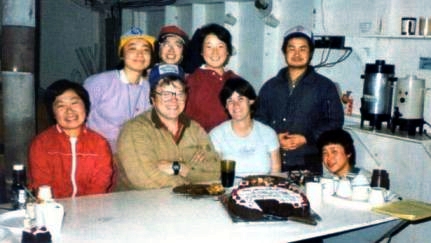
Mike
Downey and his wife Helen (seated) surrounded by Japanese women
assigned to work in Kodiak, Alaska and a Japanese engineer
That night we all sat with Father in the living room and he taught us by demonstrating how to make an elaborate rig for catching halibut. He was skilled in building tackle, his fingers Nimble, his hands strong. The next day we all boarded float planes and flew to Shuyak Island to fish for halibut. Our guides were a couple, homesteaders on that wilderness island. The plane landed in the small bay where the homestead was located and motored to the shore. Everyone stepped off of the pontoon and waded up to the beach. Since I was wearing waders, thigh high rubber boots, I carried Mother on my back up to the beach. The couple, "Red" and his common-law wife Deb, invited everyone into their small cabin and served tea and coffee. They talked to us about their self-sufficient lifestyle. Later, Father said that they were an ideal couple who reminded him of Adam and Eve living in the Garden of Eden. We spent the rest of the day fishing for halibut. Heung Jin Nim was with us. My impression was that he was a gentle young man. He wore all white clothes and a big floppy hat. He immediately made friends with the cat that lived at Bancroft house and talked to us about his cats back at East Garden.
My most enduring image of Father is him sitting cross- legged, back straight, on the engine cover of a Good Go boat. No matter what the weather or sea conditions, he always sat staring out to sea, unchanging. On the ocean, I remember his unchanging posture, completely in control of his mind and body in the midst of the constantly changing marine environment. I greatly admired his persona of self-control because I always struggled to control my mind and body.
One year, Father made a condition to travel to and fish at many locations around Alaska. At that time I was running the company's salmon operation at Egegik'° in the wilds of western Alaska. We had been preparing to someday welcome True Parents to our wind-swept outpost. We built a guest house and stocked it with all the things we would need to attend True Parents. We also bought a sport utility vehicle (SUV) and had it flown out to drive them around. When we got the word from Kodiak that they were coming, we had a Korean sister and a plane full of Korean food flown out. We then stood-by. When the call came that they were wheels up" out of Kodiak, we had less than an hour to wait. The problem was the weather. We were socked in. The thick fog was right down on the deck. Our airstrip was in fact the beach. I was in the SUV on the beach with a hand-held VHF radio when I established contact with the pilot. He couldn't see the ground. I turned on the SUV's headlights and drove up and down the strip. I could hear the plane's engines as it flew lower and lower. For more than twenty minutes, I tried to talk him down. It was a moment of truth for me: Could we welcome True Parents or would the weather steal our blessing? As I look back on it now, I realize how foolish I was. Luckily the pilot had no messianic vision: lie decided to turn back.
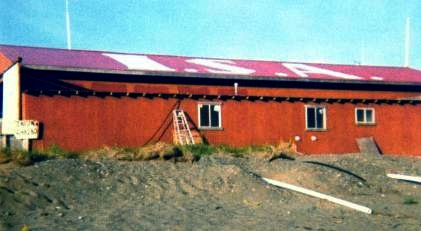
As
much as 30,000 pounds of salmon a day would be beheaded, gutted and
packed in ice here to be flown to the main plant on Kodiak Island.
Several days later they tried again and this time the weather cooperated. I showed them around the plant and we had lunch together at the guest house. Father told me that I was a lucky man because I was able to live in this paradise of ocean, rivers and tundra. He said he envied me.
Of course the main point of the trip was to fish. This was late August and what was left of the salmon run was in the river and wouldn't take a hook. When sockeye salmon enter fresh water they stop feeding. I knew this but failed to clearly report it. I had learned early not to give a pessimistic report. Anyway, there was a small chance that a hook would snag a fish. I drove them down the beach and up along the Egegik River to a spot where I had stashed a skiff. Along the way we had to cross the land of one of the local legends, a hard drinking fishing boat captain who had opened a hunting lodge on the river. We stopped briefly and I introduced him. To get down to the riverbank, we had to drive down a trail that was rough and washed out. The alder bushes scraped both sides of the truck. No matter how carefully I tried to drive, everyone was bumped and tossed around. The skiff was an eighteen- foot, flat-bottomed aluminum boat with a forty horse-power Johnson motor. It was a typical western Alaska work boat.
I had tried to clean it up as befitting the guests. The guests boarded and we loaded the gear and set out. In the boat were Mr. Choi's son, True Parents and I. Needless to say, it was not a stellar day of fishing. By the time we started upriver, the tide had already turned and the sand bars became a problem. Although the flat-bottomed boat was pretty good in shallow waters, we kept running aground on barely submerged sand bars. I tried to keep to the channels but before long I was in the water pushing the boat off the sand. Mother was in fairly good humor and at one point announced, "Oh Mack, swimming in Alaska..." The fishing was non-existent. We moved the boat and Mother and Father cast repeatedly. Over and over Mother gently urged Father, "Let's go." Father grimly ignored her. To add to the good time, the mosquitoes swarmed us. Finally Mother made a joke using a play on two similar Korean words mogi meaning "mosquito" and mulgogi meaning "fish." We can't catch fish, only mosquitoes. Finally Father said to go back.
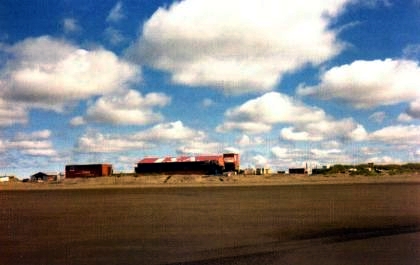
International
Seafoods of Alaska's outpost in remote Egegik, Alaska, where Mr.
Downey was in charge of salmon processing when True Parents visited.
Back at the guest house, we had tea and snacks and waited for the plane to come to pick them up. Father told us that I had a special kind of character because I was a former Marine. Then he ordered me to get a bulldozer and fix that trail down to the river. Of course I said, "Yes, sir," but what could I really do? The land was owned by the state of Alaska and was adjacent to a salmon stream. I could borrow the equipment and do it in the dead of night, but the legal exposure would be huge and the PR fallout would damage our ability to work in the area. Furthermore, during the very next flood the trail would be washed out all over again. He had ordered it done, but how could I explain these complexities to Father? I have a great deal of sympathy for the leaders who were with Father constantly.
One day at North Garden in Kodiak, Father stood up to sing and to my delight and surprise he sang "At the Café." This Jin Hee Choi song was popular in Korea in the 1980s. The final line is "Love is just a memory" which Father sang twice, once in Korean and then in English. These are just my memories of True Father. They mean everything to me.